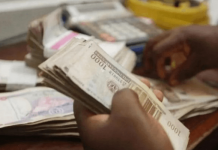Human rights lawyer, Mr. Femi Falana (SAN), has filed a suit at the Federal High Court in Abuja asking for an order restraining the Central Bank of Nigeria from allowing market forces to determine the exchange rate of the naira.
The renowned lawyer also asked the court to direct the CBN to stop the use of the United States of America’s dollar as a legal tender in Nigeria.
The suit, FHC/ABJ/CS/146/16, which was filed on behalf of Falana by a lawyer in his firm, Mr. Wisdom Elum, names the CBN as the sole defendant and is yet to be assigned to a judge.
Falana alleged in the suit that the CBN’s monetary policy had led to a situation where too much naira was made to chase a few dollars with an attendant weaker naira and adverse multiplier effects such as rising inflation, closure of factories and high level of unemployment.
He also alleged that the CBN had so “dollarised the economy” that the foreign currency had become a legal tender, with school fees as well as rents now being charged and paid in dollars “to the detriment of the economy.”
He contended that while the CBN had fixed the exchange rate at N198 to a dollar, and President Muhammadu Buhari had continued to restate his promise not to devalue the naira, the apex bank “had allowed market forces to increase the exchange rate to over N400 to a dollar.”
A supporting affidavit deposed to by another lawyer in Falana’s law firm, Mr. Femi Adedeji, stated, “The devaluation of the currency and dollarisation of the economy have made mockery of the yet-to-be-passed 2016 budget of the Federal Government.
“The monetary policy of the defendant (the CBN) has led to a situation whereby too much naira chase few dollars, thereby making the naira weaker in relation to the dollar and instigating an adverse multiplier effect.
“The monetary policy of the defendant has also led to increasing costs, rapidly rising inflation and interest rates, closure of factories and the attendant high level of unemployment.”
The lawyer, therefore asked the court to determine, “whether the monetary policy of the defendant, which allows market forces to fix and determine the exchange rate of the naira is not a violation of Section 16 of the CBN (Establishment) Act 2007 and Section 16 of the Constitution of the Federal Republic of Nigeria, 1999 as amended.”















